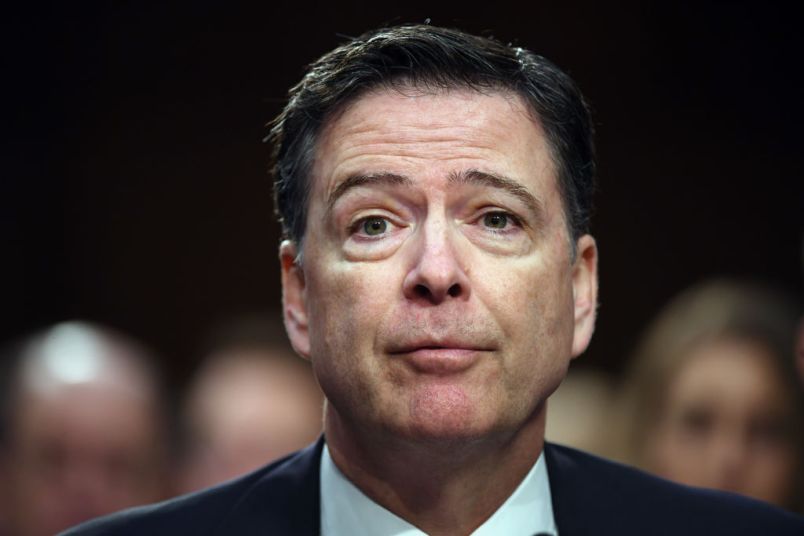Several top officials at the FBI believed that concern about leaks from the bureau’s New York office played a role in then-Director James Comey’s fateful decision to publicly announce the reopening of the Hillary Clinton email investigation just 11 days before the 2016 presidential election.
The Justice Department Inspector General (IG) report released Thursday found that senior FBI officials at the time — including General Counsel James Baker, top aide Lisa Page, and top FBI agent Peter Strzok — believed that fear of leaks prompted the letter’s release.
The news that the Clinton email probe had been reopened badly damaged Hillary Clinton’s campaign, perhaps costing her victory.
“Numerous witnesses connected this concern about leaks specifically to [the New York office] and told us that FBI leadership suspected that FBI personnel in [the New York office] were responsible for leaks of information in other matters,” the report said. “Even accepting Comey’s assertion that leaks played no role in his decision, we found that, at a minimum, a fear of leaks influenced the thinking of those who were advising him.”
Comey denied to investigators that fear of leaks played a role.
Comey told the IG’s office that he “didn’t make this decision because [he] thought it would leak otherwise,” adding that “that would be a cowardly way to make a decision.” He did acknowledge that he “consoled” himself with the knowledge that “it would have come out anyway.”
As the report puts it, others had “a different recollection.”
“The discussion was somebody in New York will leak this,” Baker said. “[T]he sense was that that this significant of a step is not going to go unnoticed. And if we don’t put something out, somebody will leak it. That’s just what we talked about.”
Page told the IG that her “personal belief” was that there was “a substantial and legitimate fear that when we went to seek the warrant in order to get access to the Weiner laptop, that the fact of that would leak.”
Then-deputy attorney general Sally Yates, meanwhile, told the IG that the FBI explicitly cited the threat of leaks in explaining their decision to go public to Justice Department.
As Yates put it, one of the reasons the FBI “gave for why they felt like [Comey] had to go to Congress is that they felt confident that the New York Field Office would leak it and that it would come out regardless of whether he advised Congress or not.”
The report’s authors do not definitively say whether or not they think the decision was driven by worries about leaks, but note repeatedly that few shared Comey’s view.
“Although we acknowledge that Comey faced a difficult situation with unattractive choices, in proceeding as he did on October 28, Comey made a serious error of judgment,” the report concludes.
The allegation that DOJ or FBI officials “improperly disclosed non-public information” was one of five points included in Inspector General Michael Horowitz’s January 2017 memo laying out the parameters of his investigation.
Much of the speculation focused on Trump ally Rudy Giuliani, who in the run-up to Election Day claimed to have a direct line on the “revolution coming on in the FBI” over the handling of the Clinton email investigation. Giuliani even told Fox News on Nov. 4, 2016 that he had advance knowledge that the FBI was reviewing new Clinton-related emails found on the laptop of Anthony Weiner, then-husband of top Clinton aide Huma Abedin.
The sources of those leaks, according to reports in the Daily Beast, Reuters, and Vanity Fair, were disgruntled current and former agents in the FBI’s New York office. Giuliani retained close ties to the office from his days as a U.S. attorney in Manhattan.
Giuliani’s name is not mentioned in the IG report, nor is a definitive assessment on whether the New York office was the primary source of leaks.
Instead, the report lays out Comey’s comments on whether his actions were driven by concerns about leaks next to that of other FBI and DOJ officials.
The IG concluded that Comey ignored long-established DOJ and FBI norms in going public, and that he “engaged in ad hoc decisionmaking based on his personal views even if it meant rejecting longstanding Department policy or practice.”
“Ironically, in his effort to avoid the FBI or himself being seen as political, Comey based his decision, in part, on his assessment of the likely outcome of the political process,” the report said.







So they really didn’t bother to look into whether the corrupt NY field office was leaking to Rudy despite ample evidence it was? They thought text messages between lovers should take priority?
This is so disheartening. Who knew there would be so few people in government willing to stand up for the law?
Add: There is this however. https://mobile.twitter.com/kyledcheney/status/1007322502513811456
Another end result of Republicans “working the refs”.
Fear of leaks? What fear, Rudy was bragging about leaked information!
Totally unrelated to this but with all that is going on today I know I missed it until a few minutes ago. Rob Rogers, political cartoonist extraordinaire, was fired today by the Pittsburgh paper he had been working at for 25 years. Rumor has it he was fired for continuing to draw anti Trump political cartoons after pro Trump management had told him to stop.
"Top FBI officials feared the corporate MSM, run by conservative billionaires."
Fixed it.